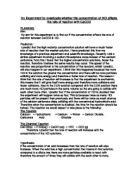3 Glass Measuring Cylinders
Water
Molars 0.25, 0.5, 1, 2, 4 of Hydrochloric Acid (20cm³)
3 Conical Flasks
3 Rubber Bungs
3 Rubber Tubes
Medium sized pieces of Limestone
Weighing Machine
Plastic container
3 Beakers
Plan:
We will fill a large plastic container with water, and then we place the three beehives into the water. Taking the three rubber tubes we'll place them through holes in the beehives and thread them through.
Taking the three measuring cylinders we will place them into the plastic container full of water dipping them into the water, and filling them full with water with no air-bubbles. Once we have done this we will put the remaining rubber tubing into the measuring cylinder. Meanwhile we will place 20cm3(each) of the HCL acid in 3 conical flasks placed near three of the measuring cylinders. Around this time someone will go and weigh out 3 measurements of medium sized limestone pieces (they all must weigh the same). Once we have done all of this, we shall make sure the stopwatch is ready and drop the stones into the acid place the bung on and record the times. The amount of water that is lost from the cylinders is how fast the reaction took.
Prediction:
I predict that the higher the molar we use in the experiment the faster the experiment will become. As I have said in my introduction about concentration, the higher the concentration of a substance/solution in an experiment. This is because when oxygen is used up it causes more collisions between molecules that speed up the rate of reaction.
What will we do to make it a fair test?
First of all we will use the same amount of HCL acid each time we do an experiment. Also we will use the same weight, size, and type of rock. When we fill the measuring cylinder up with water we will ensure that no air pockets are trapped that could alter the results we get. Also each type of equipment we use will be hopefully of the same type.
Method:
We did this experiment over 3 lessons, which fortunately gave us ample time to do the reactions. To be honest the first lesson was really getting to terms with the method of the experiment and the ways we could make the experiment unfair. Then over the next two lessons we did the actual experiment. Everything went according to plan; all of us did different jobs. I did the job of recording the result and timing each interval. So we immersed the beehives in a plastic container full of water then we organised the measuring cylinders with the rubber tubing. Then we weighed the rocks, organised the acids in the flasks. After that we placed the rocks within the acid, placed the rubber bung on top and recorded the results. We repeated each experiment 3 times for each molar we did in total we did this experiment 15 times.
Diagram:
Analysis: If we have a look at the results that I have obtained from the experiment it stays true to the hypothesis that I have suggested earlier in my introduction and prediction that the higher the molar/concentration of a substance the faster the rate of reaction occurs. It took more time for the lesser molar acids to finish the reaction while with the higher molar acids we could not keep up with the rate and most probably attributed to anomalous results. Each of the graphs has a positive gradient and since it is a straight-line graph going through the origin, the equation is y= m x.
Evaluation:
This experiment I find, went very well as opposed to the last experiment I did. It was a combination of 99% accuracy and 1% inaccuracy. Though saying that there were a couple of slight glitches that could have been ironed out. Firstly we kept using beehives of different materials (some ceramic and some thin, cheap plastic) the plastic would usually be unstable which would cause air pockets. Also when we put the rocks into the acid there was some hesitation so each experiment would have been started at totally different times. Another problem encountered is that toward the end of experiments (when it cam to higher molars) the rate of reaction goes so fast that we could not adequately record results down. I think
That those mistakes could have been over come if we had either 1) more time to do the experiment or 2) there were more people manning each station of the experiment.
In an ideal world I think I would do a similar experiment but in a more hi-tech lab with constant equipment allocated only to me and there was more of a time-span.







